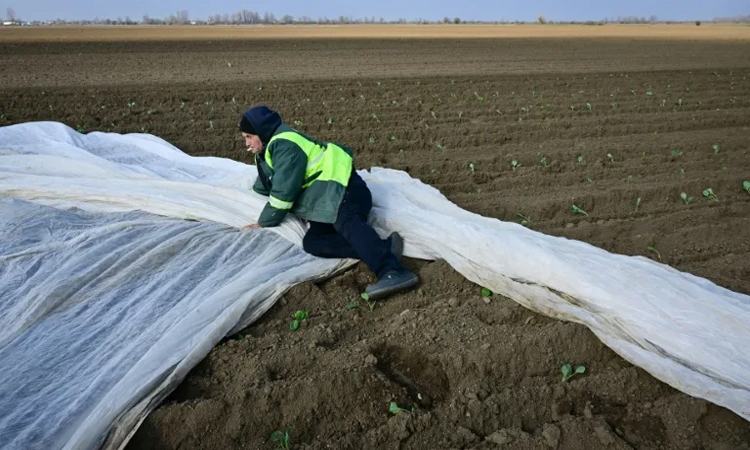News Flash
News Flash

LUNGULETU, Romania, April 29, 2025 (BSS/AFP) - In a field in southern Romania, Marius Valeriu battles a stubborn wind to spread foil over his cabbage sprouts. Ahead of Sunday's presidential elections, he blasts politicians for not helping him deal with soaring prices.
"All of them are thieves. We need to get rid of them once and for all," said the 56-year-old farmer, who plans to vote for the far right along with many others in his village.
"The people have woken up. Everybody's determined for change," he told AFP.
The election is a rerun after November elections were cancelled amid allegations of Russian interference in favour of far-right candidate Calin Georgescu, who was barred from the new vote.
With the EU and NATO critic banned, Valeriu has turned to far-right AUR party leader George Simion, who claims to run with Georgescu's blessing and could gain around 30 percent of the vote, putting him ahead of 10 other candidates in Sunday's first round, according to surveys.
Simion has frequently branded himself as a defender of Romanian farmers, "those who want to work, but are mocked" by the state.
"At least he talks to people," said Valeriu, in whose village of Lunguletu many people work in agriculture, cultivating cabbage and potatoes, and 43 percent opted for Georgescu.
- Distrust -
In Romania, one of the EU's poorest countries with deep inequalities and one of the highest inflation rates in the bloc, the far right has capitalised on popular anger in particular in villages and small towns.
Promising "respect" for Romanians, Simion was among far-right politicians promoting a boycott of foreign-owned supermarkets in February, saying they were raising prices too much and making "a mockery of this country".
While exploding prices and corruption are voters' main concerns, according to opinion polls, distrust in institutions and politicians has deepened -- not least because the same political class has been in power since the end of communism almost 40 years ago.
Many voters though are still undecided.
"We want change, but we don't have much of a choice. We'd rather not vote," 35-year-old Ionut Neacsu, Valeriu's son-in-law, told AFP as he and his wife helped out in the field.
In the nearby village of Baleni, where the far right also did well in last year's vote, several women working in agriculture told AFP they trusted none of the candidates to bring about change.
"Who should we vote for?" asked Constanta Maslina, a 72-year-old pensioner picking radishes in a greenhouse for extra money.
"Don't they see that we're poor, we have nothing to live on? They steal like crazy and we starve."
- 'Unpredictable' -
The electorate is "very unpredictable" and the election battle is "very close and volatile", according to Barbu Mateescu, a sociologist.
"There are parts of society that feel very strongly that they are not in control, they have the sentiment that the world isn't paying attention to them," Mateescu told AFP.
Eighteen years after Romania joined the European Union, its citizens massively support remaining in the bloc, according to surveys. But they also want politicians who better look after their economic interests.
"It's an extraordinarily strong psychological need for the Romanian people" to have leaders who prove "that they put Romanians' interests first", Mateescu said.
The Russian invasion of Romania's neighbour Ukraine has also rattled nerves, with drone fragments regularly falling onto Romanian soil, and many Romanians are afraid their country could be drawn into the war.
Simion, who has said he would refuse to provide military support to Ukraine, has also railed against the European Union's support for Ukrainian farmers -- which many Romanians say is generating unfair competition.
"What do we need the EU for?" Valeriu said in his field in Lunguletu. "We live from one month to the next. And it's getting harder and harder."